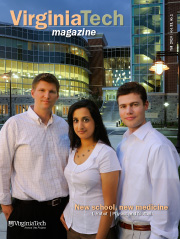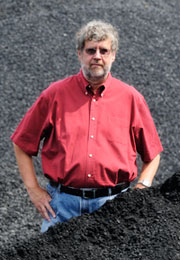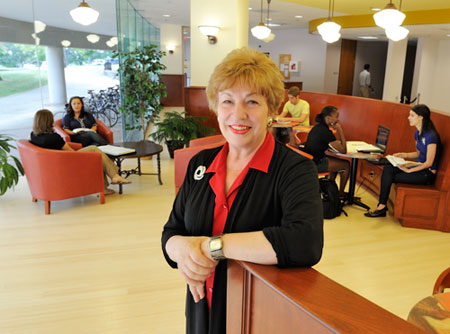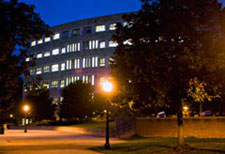 |
|
||||||
|
|
||||||||||||||||||||||||||||||||||||||||||||||||||||||||||||||||||||||||||||||||||||||||||||||||||||||||
|
Reviving damaged ground
Topsoil is scraped up and set aside. Deeper earth that contains the valuable materials--which are used to make products such as paint, suntan lotion, and ceramic glazes--is wetted and run through cyclones and spirals to separate the titanium and zircon from the soil. The soil is returned to the pit, covered with topsoil, and replanted. In theory, landowners should be able to have the best of both worlds, profiting from their land's mineral riches without losing the ability to farm. In practice, yields on lands mined this way were poor--until W. Lee Daniels (forestry '78, M.S. agronomy '80, Ph.D. agronomy '85), the Thomas B. Hutcheson Jr. Professor of Crop and Soil Environmental Science, helped identify a problem. "Because of the very heavy compaction in the soil, you have to rip it," said Daniels, referring to a method of loosening the soil many feet down. Daniels conducted research that led the mining company, Iluka Resources, to start using gigantic tilling machines on the soil that was returned to the original excavations. The practice also includes customized liming and fertilization. "They are now to a point where, with the right protocols, they get back 80 to 85 percent of the pre-mining [agricultural] yield, which is pretty darn good," Daniels said. So good, in fact, that the Interstate Mining Compact Commission gave a national award to Iluka for its work in Virginia in 2009. Less-damaging methods of mining Daniels has been researching how to bring mining-damaged soil back to productive use since the early 1980s, when demand for such knowledge arose alongside stricter environmental regulation. In the 1990s, Daniels broadened his research to address how to restore damaged wetlands. Companies and landowners rely on his work for practical methods of complying with environmental regulations. "You cannot view mining or mineral extraction as a totally benign procedure with no impact," Daniels is quick to point out. "But what I have focused on is understanding a [mining] process, figuring out how to work with industry and regulators to minimize the impact during the process, and potentially eliminating off-site impacts." Daniels began his mining-related research as part of what is now the Powell River Project, a Virginia Tech-led program that puts research into practice in the coalfields of southwestern Virginia. He has researched ways to return thousands of acres of coal-waste piles to productive use and how to address the danger of dissolved salts leaching from the valley fills created in mountaintop-removal mining. By sharing his expertise with industry, Daniels has improved mining practices. By sharing his expertise in the classroom, he has helped thousands of students understand soil science and management--essential knowledge for agriculture, forestry, and urban-land management. More than 100 students attend his introductory soil science lecture course. He has served on the committees of more than 75 graduate students and has been major advisor for 21 more, including John Michael Schmidt (biological sciences '98, M.S. crop and soil environmental sciences '02), who is now a legislative assistant for U.S. Sen. Russ Feingold of Wisconsin. "I think he's a great mentor," said Schmidt, who first met Daniels during a high school program at the Powell River Project and later studied under him as both an undergraduate and a graduate student. "He's always approachable and tries to, as much as he can, integrate folks into his lab and look for opportunities for students." A professorship named for his own mentor In June, Daniels was one of several outstanding faculty members appointed to named professorships--titles that donors create to enhance the ability of extraordinary teachers and researchers to do good work. His professorship was endowed in 1985 to honor the agronomy department head who died that year. Daniels said the prestigious title will help as he applies for research grants. The Hutcheson professorship also provides discretionary funding that Daniels views as "seed money" for early-stage research projects. "It helps to support my overall operations," Daniels said of his new title. But for him this appointment is not just professionally useful. After finishing his master's in 1980, Daniels was working as a research associate on the Powell River Project. It was Hutcheson who steered him into an instructor position in 1982. Hutcheson also served on Daniels' dissertation committee. He was lobbying for Daniels to join the tenure track, but died of a heart attack just a month before Daniels defended his dissertation in 1985. Two years later, Daniels became an assistant professor--an opportunity for which he is still grateful to Hutcheson. "I'm really humbled to be in this position," Daniels said of the professorship named for his mentor. "It means a lot to me."
|
|
|||||||||||||||||||||||||||||||||||||||||||||||||||||||||||||||||||||||||||||||||||||||||||||||||||||||
| - - - - - - - - - - - - - - - - - - - - - - - - - - - - - - - - - - - - - - - - - - - - - - - - - - - - - - - - - - - - - - - - - - - - - - - - | ||||||||||||||||||||||||||||||||||||||||||||||||||||||||||||||||||||||||||||||||||||||||||||||||||||||||
|
Donors make a difference at Newman Library
Six floors up, in a section of the library closed to the public, a high-tech conference room is being installed. For the library's technical services unit, the project--made possible by an anonymous gift--provides much-needed space for meetings and Web-based training sessions. "Technical services work has changed radically with the Internet, and higher-level technical skills are essential," said Leslie O'Brien, director of the Jean Russell Quible Department of Technical Services. "Training and continuing education, which have always been important, are even more critical now." O'Brien's department purchases materials, licenses databases and journals, collects usage data, and classifies materials for Addison, the library's catalog. "Everyone benefits from the work of the unit, even though they may not interact with the department directly," said Eileen Hitchingham, dean of university libraries. Another exciting development for the library is the creation of the Gary Musolf Business Resource Fund--the first library endowment to focus on the needs of one of Virginia Tech's colleges. The fund provides money for materials that support Pamplin College of Business teaching or research. Gary Musolf (business administration '66), grateful for the library's support of his studies, endowed the fund. "The library was just so valuable for me, especially in my first year at Virginia Tech," the Macon, Ga., resident said. "I found a lot of support there, and it was a great place to go study. I don't know if I would have gotten through my first year if I hadn't had that resource available." Library officials hope to set up similar funds for other colleges, with help from donors who want to ensure that the most relevant information in a particular field of study can be readily accessed. Ellen Krupar, librarian for the Pamplin College of Business, said permanent, predictable support from an endowment is especially welcome. "Knowing you can depend on that money means you can buy materials with yearly costs, such as journals, compendiums of statistics, or research report subscriptions," she said. Just as Musolf did, today's students still rely on the library as a place to study and get support. By supporting the café project, multiple donors have lent their own support. "People may think of a library in terms of its collections, but it's equally important as a place where students can spend long hours working individually or in a collaborative setting," said Hitchingham. "This project helps us provide that space."
|
|
|||||||||||||||||||||||||||||||||||||||||||||||||||||||||||||||||||||||||||||||||||||||||||||||||||||||
|
|
||||||||||||||||||||||||||||||||||||||||||||||||||||||||||||||||||||||||||||||||||||||||||||||||||||||||





